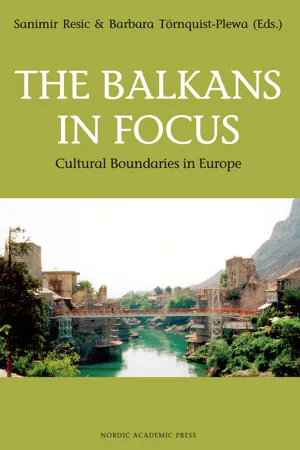
- 234 pages
- English
- ePUB (mobile friendly)
- Available on iOS & Android
About this book
Discussing the complex weave of cultural links and the different religious and linguistic groups that have been living side by side in the Balkans for centuries, this anthropological study is the result of a project initiated to create a network of scholars from Scandinavia and the Yugoslav successor states devoted to the study of post-Yugoslav cultural and political developments. Nine papers on problems of cultural boundaries are presented with the idea of countering the picture of the Balkans as a huge borderland where irresolvable age-old ethnic and religious rivalries will inevitably cause conflict as informed by stereotypes and oversimplifications. Topics include the historical crossing of religious borderlines, the legitimizing efforts of elites to create national identities, struggles to declare "ownership" over the origins of a particular musical instrument, and similar topics.
Frequently asked questions
- Essential is ideal for learners and professionals who enjoy exploring a wide range of subjects. Access the Essential Library with 800,000+ trusted titles and best-sellers across business, personal growth, and the humanities. Includes unlimited reading time and Standard Read Aloud voice.
- Complete: Perfect for advanced learners and researchers needing full, unrestricted access. Unlock 1.4M+ books across hundreds of subjects, including academic and specialized titles. The Complete Plan also includes advanced features like Premium Read Aloud and Research Assistant.
Please note we cannot support devices running on iOS 13 and Android 7 or earlier. Learn more about using the app.
Information
Table of contents
- Title Page
- Copyright Page
- Table of Contents
- Introduction
- On Religious and Cultural Borderlines in Southeastern Europe
- Weak States, Uncivil Societies and Thousands of NGOs: Benevolent Colonialism in the Balkans
- South Slav Traditional Culture as a Means to Political Legitimization
- Who owns the Gusle? - A contribution to Research on the Political History of a Balkan Instrument
- Women Partisans as Willing Executioners in Croatian Popular Memory of the 1990s
- Bosnia and Herzegovina: Boundaries and Permeation
- Non-ethnic Condemnation in Post-War Stolac - An Ethnographic Case-Study from Bosnia-Herzegovina
- Establishing and Dissolving Cultural Boundaries - Croatian Culture in Diasporic Contexts
- Ex-Home: “Balkan Culture” in Slovenia after 1991
- Notes
- About the Authors